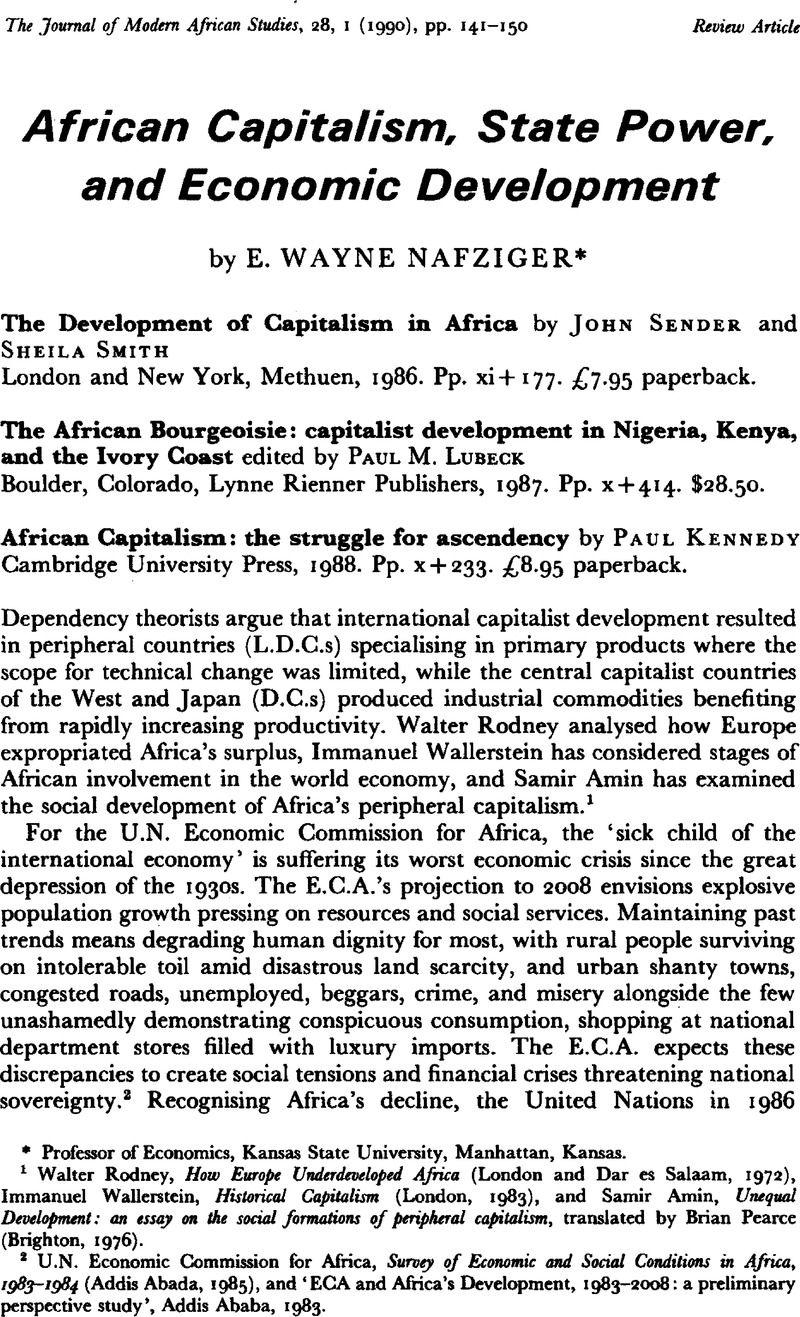Article contents
African Capitalism, State Power, and Economic Development
Published online by Cambridge University Press: 11 November 2008
Abstract

- Type
- Review Article
- Information
- Copyright
- Copyright © Cambridge University Press 1990
References
2 U.N. Economic Commission for Africa, Survey of Economic and Social Conditions in Africa, 1983–1984 (Addis Abada, 1985), and ‘ECA and Africa's Development, 1983–2008: a preliminary perspective study’, Addis Ababa, 1983.
3 U.N. General Assembly, Programme of Action for African Economic Recovery and Development, 1986–1990, (New York, 1986).
4 Nafziger, E. Wayne, Inequality in Africa: political elites, proletariat, peasants and the poor (Cambridge, 1988), pp. 31–2, and The Economics of Developing Countries (Englewood Cliffs, N.J., 1990), pp. 138 and 188–93.Google Scholar
5 Césaire, Aimé, ‘On the Nature of Colonialism’, in Markovitz, Irving Leonard (ed.), African Politics and Society: basic issues and problems of government and development (New York and London, 1970), p. 41.Google Scholar
6 Curtin, Philip, Feierman, Steven, Thompson, Leonard, and Vansina, Jan, African History (London and Boston, 1978),Google Scholar and Markovitz, Irving Leonard, Power and Class in Africa: an introduction to change and conflict in African politics (Englewood Cliffs, N.J., 1977).Google Scholar
7 Nicolson, I. F., The Administration of Nigeria, 1990–1960: men, methods, and myths (Oxford, 1969), pp. 216 and 246.Google Scholar
8 Eicher, Carl K. and Baker, Doyle C., Research on Agricultural Development in Sub-Saharan Africa: a critical survey (East Lansing, 1982), pp. 17–23.Google Scholar
9 Peter Anyang' Nyong'o, ‘The Development of Agrarian Capitalist Classes in the Ivory Coast, 1945–1975’, in Lubeck (ed.), op. cit. pp. 185–6.
10 Gavin Kitching, ‘The Role of a National Bourgeoisie in the Current Phase of Capitalist Development: some reflections’, in Ibid. p. 43.
11 Amin, Samir, L'Afrique de l'ouest bloquée (Paris, 1971), translated by Francis McDonagh and published as Neo-Colonialism in West Africa (Harmondsworth and New York, 1973).Google Scholar
12 Nicola Swainson, ‘Indigenous Capitalism in Postcolonial Kenya’, and Steven Langdon, ‘Industry and Capitalism in Kenya: contributions to a debate’, in Lubeck (ed.), op. cit. pp. 137–63 and 343–81.
13 World Bank, Workd Development Report 1989 (New York, 1989), p. 164.Google Scholar
14 Thomas J.Biersteker, ‘Indigenization and the Nigerian Bourgeoisie: dependent development in an African context ’, in Lubeck, (ed.), op. cit. pp. 249–79.
15 Tom Forrest, ‘State Capital, Capitalist Development, and Class Formation in Nigeria’, in Ibid. pp. 307–42.
16 World Bank, Sup-Saharan Africa. From Crisis to Sustainable Growth: a long-term perspective study (Washington, D.C., 1989), p. 221.Google Scholar
17 Sklar, Richard L., ‘The Nature of Class Domination in Africa’, in The Journal of Modern Africa Studies (Cambridge), 17, 412 1979, pp. 531–52.CrossRefGoogle Scholar
18 U.N. Development Programme and World Bank, African Economic and Financial Data (Washington, D.C., 1989), p. 72.
19 See Nafziger, Inequality in Africa, pp. 76–7, 122–3, and 147, for a criticiam of the widely-held view concerning Malswi's successful capitalist development.
20 Turner, Terisa, ‘Commerical Capitalism and the 1975 Coup’, in Keith, Panter-Brick (ed.), Soldiers and Oil: the political transformation of Nigeria (London, 1978), pp. 166–97.Google Scholar
21 Bates, Robert H., Markets and States in Tropical Africa: the political basis of agricultural policies (Berkely and Los Angeles,1981), p. 103.Google Scholar
22 World Bank, Kenya: into the Second decade (Washington, D.C., 1975), p. 298.Google Scholar
23 Swainson, Nicola, ‘The Rise of a National Bourgeoisie in Kenya’, in Review of Africa Political Economy (Sheffield), 8, 01–04 1977, pp. 39–55.Google Scholar
24 Nafziger, E. Wayne, ‘The Japanese Development Model: its implications for developing countries’, in Billetin of the Graduate School of International Relations (International University of Japan, Yamato-machi, Niigata), 5, 07 1986, pp. 1–26.Google Scholar
25 Adebayo, Adedji (ed.), Indigenzation of African Economies (London, 1981).Google Scholar
26 Nafziger Inequality in Adfrica, pp. 89–90 and 101, and Ogbuagu, Chibuzo S. A., ‘The Nigerial Indigenization Policy: nationalism or pragmatism?’, in Africa Affairs (London), 82, 327, 04 1983, pp. 241–66.Google Scholar
27 International Labour Office, Employment, Incomes, and Equality: a strategy for increasing productive employment in Kenya (Geneva, 1972).
28 Lecaillon, Jacques, Paukert, Felix, Morrisson, Christian, and Germidis, Dimitri, Income Distribution and Economic Development: an analytical survey (Geneva, 1984), pp. 54–8.Google Scholar
29 Okello Oculi, ‘Green Capitalism in Nigeria, in Lubeck (ed.), op. cit. pp. 167–84, and Nyong's, loc. cit.
30 Cf. Lipton, Michael, Why Poor People Stay Poor: a Study of urban bias in world development (London, 1977), pp. 147–9 and 231–5; Bates, op. cit,; and Nafziger, Inequality in Africa, pp. 140–56.Google Scholar
- 4
- Cited by


